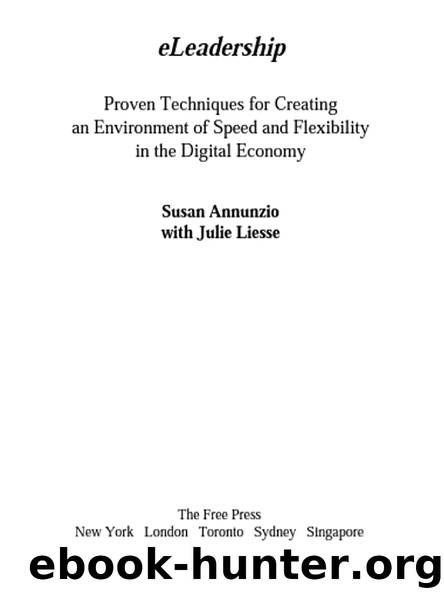eLeadership by Susan Annunzio

Author:Susan Annunzio
Language: eng
Format: epub
Publisher: THE FREE PRESS
Published: 2001-07-15T00:00:00+00:00
The Hidden Costs of Secrecy
If you do not give your workforce a chance to speak honestly about their problems and concerns, that doesn’t mean you’ll shut down the water-cooler chatter. The absence of a forum to speak the unspeakables only means that people will be voicing these concerns out of earshot.
They still will speak the unspeakables—you can be assured of that. But they will talk behind closed doors, after the meeting is over, frequently with inaccurate information. These are the conversations people will have over and over again, instead of working. And you will have no opportunity to correct misunderstandings and misinformation. Misperceptions will be reinforced.
When the unspeakable truth is spoken behind closed doors, people use emotional logic to explain what you as company leader have not had a chance to explain to them. That means when they don’t have the facts, people will reach a subjective conclusion to explain something that doesn’t make sense to them. They make up an explanation. And human nature dictates that the likelihood of making up something worse than the truth is extremely high.
A large midwestern company had committed millions of dollars to a new total quality management system. Managers dutifully asked their workers how they should implement the new system. After the system was installed, management passed out report forms to measure whether the new system actually was reducing cycle time.
According to those forms, cycle time was down. But in focus groups, floor managers said the statistics weren’t true—that, in fact, they had lied on the forms.
Why would they lie? Well, they said, management lied to us: They asked for our input on the new system, but we didn’t see our ideas included.
Management had gathered initial feedback, but had not taken the time to explain how final decisions were made, and how that employee feedback had been used—or not used. In the absence of any explanations, employees assumed deception and therefore felt free to sabotage the company’s plans. And they felt no guilt in doing so.
In this case, the company had spent $10 million on the TQM program. Its inability to work honestly with its employees made it unlikely the company would see a fair return on that investment. The cultural issues got in the way of financial performance.
Such deliberate sabotage may be the most severe consequence of keeping the truth locked up. But treating your employees as if they can’t handle the truth also may induce a passive/aggressive behavior that’s almost as troublesome. Thinking to themselves, “You don’t care what I think,” employees will respond by bringing their bodies to work, but checking their brains at the door.
Then there are the more subtle consequences of keeping the truth at bay. When people don’t have a chance to express their intense feelings directly, those feelings tend to manifest themselves in other ways.
If you allow people to vent their emotions, then you can get into their brains. If they can’t vent, they will act out their feelings through their behavior. But their feelings will get expressed, either verbally or behaviorally.
Download
This site does not store any files on its server. We only index and link to content provided by other sites. Please contact the content providers to delete copyright contents if any and email us, we'll remove relevant links or contents immediately.
Hit Refresh by Satya Nadella(9118)
The Compound Effect by Darren Hardy(8919)
Change Your Questions, Change Your Life by Marilee Adams(7733)
Nudge - Improving Decisions about Health, Wealth, and Happiness by Thaler Sunstein(7689)
The Black Swan by Nassim Nicholas Taleb(7101)
Deep Work by Cal Newport(7058)
Rich Dad Poor Dad by Robert T. Kiyosaki(6600)
Daring Greatly by Brene Brown(6501)
Principles: Life and Work by Ray Dalio(6408)
Playing to Win_ How Strategy Really Works by A.G. Lafley & Roger L. Martin(6212)
Man-made Catastrophes and Risk Information Concealment by Dmitry Chernov & Didier Sornette(6001)
Big Magic: Creative Living Beyond Fear by Elizabeth Gilbert(5749)
Digital Minimalism by Cal Newport;(5747)
The Myth of the Strong Leader by Archie Brown(5491)
The Slight Edge by Jeff Olson(5407)
Discipline Equals Freedom by Jocko Willink(5376)
The Motivation Myth by Jeff Haden(5202)
The Laws of Human Nature by Robert Greene(5164)
Stone's Rules by Roger Stone(5079)
